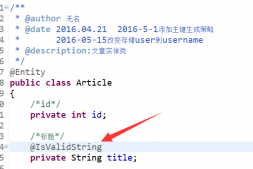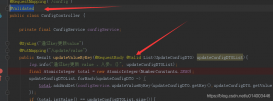java中实现list或set转map的方法
在开发中我们有时需要将list或set转换为map(比如对象属性中的唯一键作为map的key,对象作为map的value),一般的想法就是new一个map,然后把list或set中的值一个个push到map中。
类似下面的代码:
|
1
2
3
4
5
|
List<String> stringList = Lists.newArrayList("t1", "t2", "t3"); Map<String, String> map = Maps.newHashMapWithExpectedSize(stringList.size()); for (String str : stringList) { map.put(str, str); } |
是否还有更优雅的写法呢?答案是有的。
guava提供了集合(实现了Iterables接口或Iterator接口)转map的方法,方法定义如下:
|
1
2
3
4
5
6
7
8
9
10
11
12
13
14
15
16
17
18
19
20
21
22
23
24
25
26
27
28
29
30
31
32
33
34
35
36
37
38
39
40
41
42
43
44
45
|
/** * Returns an immutable map for which the {@link Map#values} are the given * elements in the given order, and each key is the product of invoking a * supplied function on its corresponding value. * * @param values the values to use when constructing the {@code Map} * @param keyFunction the function used to produce the key for each value * @return a map mapping the result of evaluating the function {@code * keyFunction} on each value in the input collection to that value * @throws IllegalArgumentException if {@code keyFunction} produces the same * key for more than one value in the input collection * @throws NullPointerException if any elements of {@code values} is null, or * if {@code keyFunction} produces {@code null} for any value */public static <K, V> ImmutableMap<K, V> uniqueIndex( Iterable<V> values, Function<? super V, K> keyFunction) { return uniqueIndex(values.iterator(), keyFunction); } /** * Returns an immutable map for which the {@link Map#values} are the given * elements in the given order, and each key is the product of invoking a * supplied function on its corresponding value. * * @param values the values to use when constructing the {@code Map} * @param keyFunction the function used to produce the key for each value * @return a map mapping the result of evaluating the function {@code * keyFunction} on each value in the input collection to that value * @throws IllegalArgumentException if {@code keyFunction} produces the same * key for more than one value in the input collection * @throws NullPointerException if any elements of {@code values} is null, or * if {@code keyFunction} produces {@code null} for any value * @since 10.0 */public static <K, V> ImmutableMap<K, V> uniqueIndex( Iterator<V> values, Function<? super V, K> keyFunction) { checkNotNull(keyFunction); ImmutableMap.Builder<K, V> builder = ImmutableMap.builder(); while (values.hasNext()) { V value = values.next(); builder.put(keyFunction.apply(value), value); } return builder.build(); } |
这样我们就可以很方便的进行转换了,如下:
|
1
2
3
4
5
6
7
|
List<String> stringList = Lists.newArrayList("t1", "t2", "t3"); Map<String, String> map = Maps.uniqueIndex(stringList, new Function<String, String>() { @Override public String apply(String input) { return input; } }); |
需要注意的是,如接口注释所说,如果Function返回的结果产生了重复的key,将会抛出异常。
java8也提供了转换的方法,这里直接照搬别人博客的代码:
|
1
2
3
4
5
6
7
8
9
10
11
12
13
14
15
|
@Testpublic void convert_list_to_map_with_java8_lambda () { List<Movie> movies = new ArrayList<Movie>(); movies.add(new Movie(1, "The Shawshank Redemption")); movies.add(new Movie(2, "The Godfather")); Map<Integer, Movie> mappedMovies = movies.stream().collect( Collectors.toMap(Movie::getRank, (p) -> p)); logger.info(mappedMovies); assertTrue(mappedMovies.size() == 2); assertEquals("The Shawshank Redemption", mappedMovies.get(1).getDescription()); } |

















